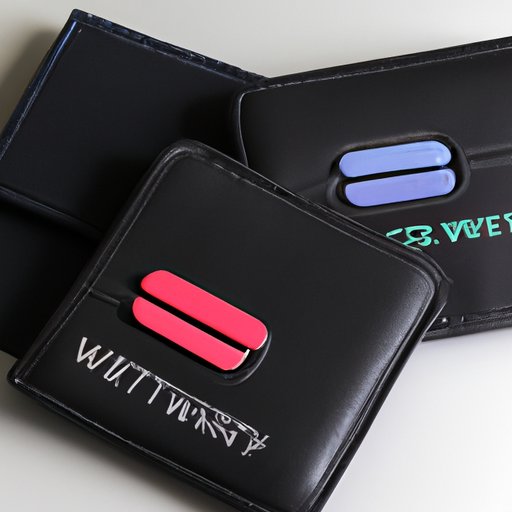Introduction
Crypto wallets are digital tools that allow users to store, manage, and spend cryptocurrencies such as Bitcoin, Ethereum, and Litecoin. In this article, we will explore what a crypto wallet is, how it works, and provide a comprehensive guide to the different types of wallets available. We will also discuss security and safety considerations when using a crypto wallet, common features, and tips for choosing an ideal wallet.
Exploring the Basics of Crypto Wallets
A crypto wallet is a software program that stores public and private keys and interacts with various blockchain networks. It allows users to send and receive digital currency, monitor their balance, and conduct other operations. Crypto wallets can be used to store a variety of digital assets but were originally created for Bitcoin.
What is a Crypto Wallet?
A crypto wallet is a digital wallet that enables users to securely store, send, and receive cryptocurrencies. A crypto wallet consists of two components: a public address and a private key. The public address is like an email address where users can receive cryptocurrency, while the private key is like a password that allows users to access and spend their funds. Crypto wallets are typically used to store and manage multiple cryptocurrencies.
How Do Crypto Wallets Work?
Crypto wallets work by storing private and public keys. The private key is like a password that provides access to funds stored in the wallet. The public key is like an email address which is used to receive funds from other wallets. To send or receive cryptocurrency, users need to enter their public address into the corresponding wallet.
Benefits of Using Crypto Wallets
Crypto wallets offer many benefits over traditional banking. They are easy to use, secure, and provide users with full control over their funds. Additionally, they are fast and cost-effective since transactions are processed almost instantly and have low fees. Finally, crypto wallets are available worldwide, so anyone with access to the internet can use them.
A Comprehensive Guide to Types of Crypto Wallets
There are several types of crypto wallets available, each with its own advantages and disadvantages. Let’s take a look at the most popular types of wallets and explore their features.
Hot Wallets
Hot wallets are online wallets that are connected to the internet. They are the most convenient type of wallet as they can be accessed from anywhere in the world. However, they are also the least secure since they are vulnerable to hacking and other security risks.
Cold Wallets
Cold wallets are offline wallets that are not connected to the internet. They provide an added layer of security since they are not exposed to online threats. Cold wallets come in the form of USB drives, physical coins, and paper wallets.
Paper Wallets
Paper wallets are printed versions of public and private keys. They are one of the safest types of wallets because they are not connected to the internet. However, they are vulnerable to physical damage and theft.
Hardware Wallets
Hardware wallets are physical devices that store public and private keys. They offer an extra layer of security since they are not connected to the internet. Hardware wallets are usually the most secure type of wallet, but they can be expensive and difficult to set up.

Understanding How Crypto Wallets Work
Now that you understand the different types of crypto wallets, let’s take a closer look at how they work.
Sending and Receiving Cryptocurrency
To send or receive cryptocurrency, users need to enter their public address into the corresponding wallet. This address is then used to transfer funds between wallets. The sender must have enough funds in their wallet to cover the amount being sent, and the recipient must have enough space in their wallet to receive the funds.
Storing Private Keys
The private key is the most important part of a crypto wallet. It is used to access funds stored in the wallet and must be kept secure at all times. Most wallets have built-in security measures to protect private keys, such as encryption and multi-factor authentication.
Accessing Funds
Once users have their private key, they can access their funds by entering it into the corresponding wallet. Depending on the type of wallet, users may need to enter additional information such as the recipient’s public address. Once the transaction is confirmed, the funds will be transferred to the recipient.
Security and Safety Considerations When Using Crypto Wallets
Crypto wallets are relatively secure, but there are some security and safety considerations to keep in mind when using them. Here are a few tips to help keep your funds safe.
Securing Your Wallet
It is important to ensure that your wallet is secure. Make sure to enable two-factor authentication and regularly change your passwords. Also, be sure to keep your private key and other sensitive information safe.
Backup and Recovery
In the event of a system failure or other issue, it is important to have a backup of your wallet. Most wallets offer the ability to make backups, which can be stored on an external drive or cloud storage. It is also important to have a recovery plan in place in case you lose access to your wallet.
Protecting Your Private Keys
Your private key is the most important part of your wallet, so it is important to keep it secure. Never share your private key with anyone and always store it in a secure location. Additionally, never enter your private key into any website or application unless you are absolutely sure it is legitimate.

Common Features of Crypto Wallets
When choosing a crypto wallet, it is important to consider the features it offers. Here are some of the most common features to look for.
User Interface
The user interface should be easy to use and intuitive. Look for a wallet that has a simple design and clear instructions. Additionally, make sure the wallet supports your preferred language.
Supported Coins
Different wallets support different coins, so make sure the wallet you choose supports the coins you want to use. Some wallets only support a handful of coins, while others support hundreds.
Exchange Support
Some wallets offer the ability to directly buy and sell coins within the wallet. This feature is especially useful for beginners who are just getting started with cryptocurrency. Not all wallets offer this feature, so make sure to check before signing up.

Tips for Choosing an Ideal Crypto Wallet
Choosing the right crypto wallet can be daunting, but there are a few tips that can help you find the ideal wallet for your needs.
Research Different Wallets
Before choosing a wallet, it is important to research different wallets and compare their features. Take time to read reviews and determine which wallet best meets your needs.
Understand Fees and Charges
Most wallets charge fees for sending and receiving cryptocurrency. Make sure to read the fine print and understand the fees associated with each wallet. Some wallets offer lower fees than others, so it pays to shop around.
Check Security Features
Security is one of the most important factors to consider when choosing a wallet. Make sure to check for features such as two-factor authentication and encryption. Additionally, some wallets offer additional features such as multi-signature authentication, which can help keep your funds secure.
Customer Service Availability
If you ever run into issues with your wallet, it is important to have access to customer service. Check to see if the wallet offers customer support and what channels are available (e.g., phone, email, live chat).
Conclusion
Crypto wallets are digital tools that allow users to store, manage, and spend cryptocurrencies. There are various types of wallets available, each with its own advantages and disadvantages. It is important to understand the basics of crypto wallets and consider security, fees, and other features when choosing a wallet. By following these tips, you can find the ideal crypto wallet for your needs.
(Note: Is this article not meeting your expectations? Do you have knowledge or insights to share? Unlock new opportunities and expand your reach by joining our authors team. Click Registration to join us and share your expertise with our readers.)
